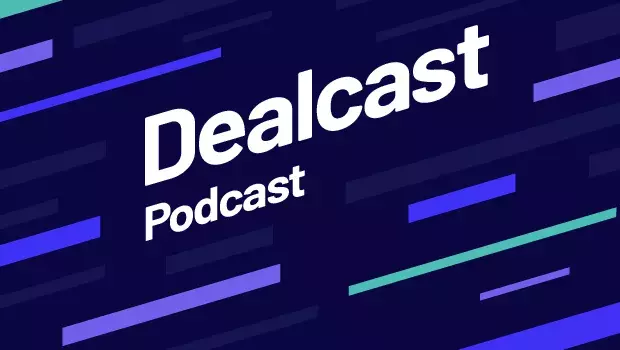M&A Tales Episode 1: Dealmaking as Improvisational Art
This special episode is part of a new series called “M&A Tales” where you’ll hear about the human side of M&A dealmaking. In this first installment, Mergermarket’s Spanish Bureau Chief Robert Cocke speaks with Marc H. Morgenstern, author of The Soul of the Deal (Simon & Schuster, 2022).
Marc, a die-hard Grateful Dead fan, is the managing partner and founder of early-stage investor Blue Mesa Partners as well as mentor-at-large for The House Fund at UC Berkeley and its portfolio companies.
From following the Dead for much of his life to telling a war story about closing a huge, time-constrained deal in only a few days, he shares his inspiring music-driven people-centric ethos and knowledge about all facets of M&A dealmaking.
“Great negotiators know how to compromise without feeling compromised,” Marc shares. “You learn both from what [people] say and you learn at least from at least what they don’t say.”
Dealcast is presented by Mergermarket and SS&C Intralinks.
Transcript
[MUSIC PLAYING] JULIANA: Hello and welcome to Dealcast, the weekly M&A podcast presented to you by Mergermarket an SS&C Intralinks. This is one of a series of special episodes called M&A Tales, where you'll hear about the human side of M&A. These episodes are presented by Rupert Polk, who is Mergermarket's Spanish Bureau Chief. In this episode, Rupert speaks to Mark Morgenstern, the author of the book The Soul of the Deal.
RUPERT POLK: Thank you for the introduction, Juliana. My name is Rupert Polk. I'm one of the journalists at the Mergermarket, and I'm excited to be here today with Mark Morgenstern for the inaugural edition of M&A Tales, a new podcast that will take a look at the human side of M&A. Welcome, Mark. It's a pleasure to be here.
MARK MORGENSTERN: Thank you so much for having me.
RUPERT POLK: The pleasure is all ours. Mark has a long track record in M&A. He's the founder and managing partner of Blue Mesa Partners, and he's also the author of a fantastic book called The Soul of the Deal, which looks at the human side of M&A. And one of the interesting things about the book is that you describe dealmaking as an improvisational art. Would you like to tell us how you came up-- how you came to this conclusion?
MARK MORGENSTERN: Yeah, it actually has two bases, which may not be obvious. One is selling encyclopedias door to door, and the other is following the Grateful Dead. Logic of it is that when you're selling encyclopedias door to door, you learn that this customer, customer A, is different the customer B, different than customer C, different than customer D.
So bad sellers of encyclopedias walk and give a canned speech. They sell what they want to sell. They don't listen. They don't hear what the buyer wants. The customer wants to buy. They don't succeed very well.
You learn to say, hey, who is this customer? What's in this house? Who are they? How can I move them? What's important to them?
The basic lesson of all of this is the first thing you do is understand your counterparty? And by the way, they're your counterparty. They're not your enemy or the other side.
The second is the Grateful Dead with encyclopedias selling as a background did the same thing musically. Every night, they would play a song. If they played it two nights in a row, the second night would be totally different. They might play "Bertha" for 3 minutes one night and 33 minutes another night, and that would be a combination of factors.
One is they're in a particular venue on a specific date with a specific audience. Some audiences might have been 2,000. Some might have been 20,000.
Some might have really loved their country songs. Some might have liked their jam songs. So you're on a stage performing.
You are responding to your audience. That's who you're paying attention to. And then they give you energy back, and it goes back and forth. Deals are the same way.
Lots of people walk in with I've done this deal 10 times before because it's an M&A deal. I know how you do an M&A deal. I do one.
I do two. I do three. I do four. I do five. They may make some deals, but they're going to not make many more because they're not starting with their counterparty.
And so if you sort of think to yourself a deal to me, both economically and structurally, is a mosaic. If you look at a standard acquisition agreement that might be 50 pages-- I don't know-- there might be 30 to 75 economic issues contained in those pages.
If somebody thinks, well, I have to get 1, 2, 3, 4, 5, 6, 7, 8, 9 all the way, then I can make a lot of deals. If somebody says, hey, as long as I get variable 1, 10, 15, and 19, that would be a good deal or 2, 3, 4, 87 would be a good deal. There are lots of different deals inside each deal, just as there are lots of different songs inside each song.
RUPERT POLK: It's really interesting. Thank you, Mark. One of the stories that struck me in the book was about a counterparty who described your CEO as a messenger from God.
Obviously, one of the basic principles of improvisation is that you need to accept what the other side offers you. So you took this unexpected message, and you ran with it. Would you like to go over the story on behalf of the listeners?
MARK MORGENSTERN: So first it is absolutely true, though I will tell you that even writing it, it seemed improbable to me. I was with a team of people, and this particular group had made probably a dozen acquisitions. So the team was very well melded together. And we were out on a trip as we frequently did just trying to have an introductory meeting with people saying, hey, we know you're not for sale. But if you ever decide you want to sell, we just want you to give us a call first.
So we really walked in basically expecting to have pastry and coffee, and the walls of this person's office had many, many, many religious artifacts. And the first thing he said to us was, I'm very religious. And we said, OK, that's fine.
And he said you need to know that because I think your CEO is a messenger from God. We all knew our CEO. That would not be my top 100,000 characterizations of him, but you're certainly not going to tell him you're wrong.
You're going to start with, OK, well, if our CEO is a messenger from God, what are the implications from that? And then you said this was on a Tuesday morning at 10:00. He said, I'm leaving.
I got called over the weekend by the leader of my religious organization. They said, I'm going on a mission for two years this coming Saturday. So if you bought this business by Thursday, I'll know your CEO is a messenger from God. If you haven't, I'll know he isn't.
We thought, OK, we don't know anything about this company. We've never seen a financial statement. We don't have any documents with us. We haven't done any diligence. What?
RUPERT POLK: I think is really important. They're coming at it from an improvisational background. Is that you say the word yes?
MARK MORGENSTERN: You say the word yes, and then you start doing. So it turned out that we're actually four separate companies. So we weren't even buying one company.
We had four separate agreements. We worked straight through Tuesday night, straight through Wednesday night, closed on Thursday. Along the way, we sort of said is he serious because that could have been a negotiating ploy.
Well, looking at this guy, he's a very mature guy, very smart. You're looking at his office. He didn't stage anything for us. He meant it literally.
He did actually believe our CEO was a messenger from God. So if you take that as a starting point, then you go backwards and say, I have to close this thing by Thursday at 3:00, then you do a critical path of here are all the things that have to happen before then.
Here's what's got to be negotiated. How much time do we have to do it? And then instead of taking two months to negotiate a price, you take two hours because that's all the time that you have.
Part of the improvisation is you're responding to the time and circumstances. We made a decision that this guy had a reputation for total integrity, so we would accept representations from him we wouldn't have accepted from someone else. We would normally do a month of diligence and go through his tax returns, and we didn't. We made a decision that these companies are so desirable.
This guy is so serious. This is our only chance to get this business. Here are the compromises we need to make on our side. Great negotiators know how to compromise without feeling compromised.
RUPERT POLK: It's a great story. I once interviewed someone who buys I think 20 or 30 companies a year. And he said that for him, the shortcut is does the vendor have great-- great ethics?
Doesn't really matter what ethical system it is, but as long as there's an ethical system there and the person has good ethics, nine times out of 10, the deal will work. And if you find that they've been cutting corners in one area, then they've probably been cutting corners in other areas as well.
MARK MORGENSTERN: You can't do a good deal with a bad person. That's just fundamental to life. And no matter what your lawyer will tell you, you can't paper that stuff over.
If someone's going to be a liar, they're going to lie about the representations too. They're going to lie about everything because that's who they are. A piece of paper is not going to protect you. It's the people that protect you.
RUPERT POLK: So that's a great point, and it brings me to my next question because I've been a journalist writing exclusively about M&A for more than 20 years. And whenever people in the world of finance talk about M&A, they normally start off with numbers and having done ratios.
And the world of M&A is so interesting and so colorful. And there's so much more to it that I thought that your approach of thinking about it, about the humanity of it really resonated with me. Do you think that in the world of M&A, people tend to overemphasize financial metrics and maybe underemphasis ethics, storytelling, character?
MARK MORGENSTERN: Yes, and they also tend to forget that the negotiations over, and the deal is closed. The deal is just started because now you own a business, and you're running it. So how you negotiate it and who you negotiate with matter a lot. Robert Hunter was the lyricist for the Grateful Dead, and one of his great lines was, "songwriting is 51% craft and 49% feel." People like what they think of as objective.
So numbers are objective. Ratios are objective. People like that.
People don't like the part that this is really-- this is art, not science. You're dealing with a human being. You have to understand who they are. They're not a cipher.
And so it's easier to emphasize numbers. And by the way, people like to feel objective. Even the numbers aren't objective. You can look at them 27 different ways, but they give people a false sense of comfort.
And one of Voltaire's truly great lines was, "uncertainty is an uncomfortable position, but certainty is an absurd one." And that's what I think of when people are looking at ratios like it's a magic number, and it will hold for all time. And there can't be a COVID, and there are no 2008s. And the world is just full of unpredictable things. That's people.
RUPERT POLK: As we mentioned before, character is much more predictable in a way. Your character, your ethics, if you get a view on that, then you can start to make predictions more than maybe from a balance sheet.
MARK MORGENSTERN: Yes, and there's a reason why when I meet anyone, it doesn't matter if it's a dinner party or an M&A deal. The first question I ask them is tell me your life story. I say don't, and they start. I'm the VP. I don't know.
Tell me. You were born someplace. You had siblings. You didn't have siblings. You had parents.
Describe your life for me. And by the way, I also point out this is not an interrogation-- life story any way you want to.
But I need to hear the words. I need to hear not that you went to college, but why did you go? How did you choose? What was your motivation?
And if I can listen to somebody for 15 minutes talk about their life story, I will tell you that when somebody leaves a gap in the story, it's just a giant red signal. They go straight from college to I'm 32. Something that we don't like happened in between there. So you learn both from what they say, and you learn at least as much from what they don't say.
RUPERT POLK: That's really interesting. I think the listeners to this podcast would be really interested if you could give us an example of a deal where treating it as a human-based exercise in improvisation yielded a good result in a way that a more conventional approach might not have succeeded. We've already had the example of the religious vendor. Could you maybe give us another example of another deal?
MARK MORGENSTERN: Yeah, and I'll make this much shorter. So I hope it will be clear. There was we had a product, incredible product. We had a distributor.
Well, the product wasn't being sold. We were going to run out of money. That's sort of the bottom line.
We hired an investment banker. Please sell the company. They try and try and try. They can't.
One of the things that you learn is scarcity motivates people to do things. And so I looked at it, went to the board of directors, and I said I'm going to fire our distributor.
They said, Mark, he's our only distributor. I said, yeah, I know that. I said, well, we won't make any sales. I said, yeah, I know that.
They said, well, why are you doing it? I said because if we do that, they will believe that they've got something to lose. They've been telling us that they would like to buy the company, but nothing has happened. So I fired him.
I went to the CEO and said, hey, there are other possible buyers, and they're not going to want you to be their distributor. You would do the same thing if you were on the other side of this discussion. I'm terminating you.
Mark, you can't do that. Yes, actually, I can. Read the contract. So we did that.
The board was pretty confused. The distributor was pretty confused. But what did I do? I introduced an urgency accelerator. I went from probably being something that's nice to have to something that they had to have, and I introduced a time element. Wait, other people might be buying to this company.
So the complete perverse logic of I'm firing our only selling relationship is pretty not obvious, but what was obvious was that the CEO was an engineer, very logical, very rational. And my guess was he was sitting looking at us and saying, they're going to run out of cash. I'll buy them for a nickel when they run out of cash. I had to change the human perception.
RUPERT POLK: It's a great story. How did it end?
MARK MORGENSTERN: We solved the business. Complicated story but essentially, I met with the guy all day, and I said, this is not IBM buying Google. This is a little itty bitty deal. You are our distributor.
You make all the sales, so you don't need a lot of representation about who our customers are because they're your customers. You don't need a lot of discussion about our revenues because you made them, or you didn't make them.
So let's think of this as a very simple it's an asset purchase deal. You're not buying a company. You're buying our patents. You're buying our intellectual property, and you entertain a bunch of employees. So I said to him this should be a six-page agreement.
I then went back to my lawyers, said I need a six-page agreement. They said we can't do it. I said, yes, you can. You have to. And anyway, they couldn't.
So I literally had to fire probably a top-five global law firm and went to another law firm and said you need to trust me. I want a six-page agreement.
Before you tell me why you can't do it, you have to do it. They gave me a 22-page agreement. I cut it down to six pages. They went crazy.
Send it to the other nice people. Their lawyers looked at it. A week later, I got back a 75-page agreement. They took my six pages, dropped it into their standard agreement, and sent it back.
I called the CEO and said, we really need to talk. And then I went to him, and I said, listen, in this hand, I've got a 75-page agreement your lawyer sent. In this hand, I've got a six-page agreement that reflects what you and I agreed to.
I said I haven't even read this. I'm not going to read it. I've got no interest in it.
I'm not selling this company. I'm selling this asset. So if your lawyers want to find somebody who wants to deal over here, they should do that. If they want to deal with me, it's over here.
So the engineer said, Mark, I completely get it. Armed with the fact that I literally wouldn't do the deal, he was able to go back to the lawyers and say, hey, I want to do the deal. Thank you for trying to protect me.
You're protecting me so much that I can't get the deal done. Go away. Leave me alone. The lawyers went to the board and said to the board, we can't stand behind this. This is legal malpractice.
And anyway, so the pieces of paper on their side didn't match the deal if the reason I didn't want 75 pages, it would take two months to negotiate it. I had three weeks of cash left. We closed with about two weeks of cash left.
RUPERT POLK: Amazing. Thanks, Mark. It's been a true pleasure.
And thank you to everyone who's listened to this podcast. So thank you, Mark. Thank you, everyone.
JULIANA: That was Rupert Polk speaking to Mark Morganstern. Thanks for listening to this episode of Dealcast presented by Mergermarket and SS&C Intralinks. Please rate, review, and follow the podcast. You'll find us on Apple Podcasts, Spotify, or look out for your Mergermarket News Alert. For more information, have a look at our show notes.
[MUSIC PLAYING]




